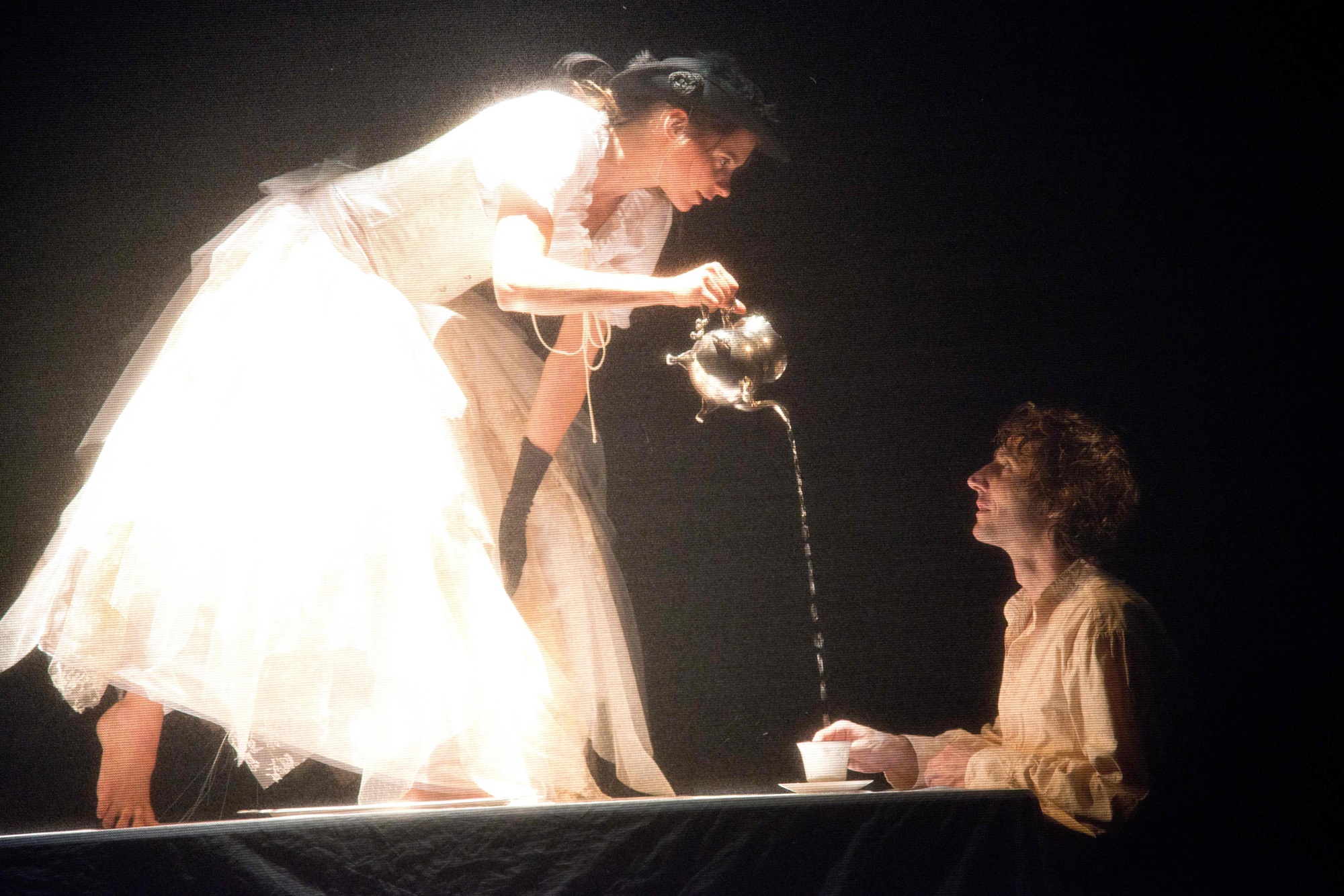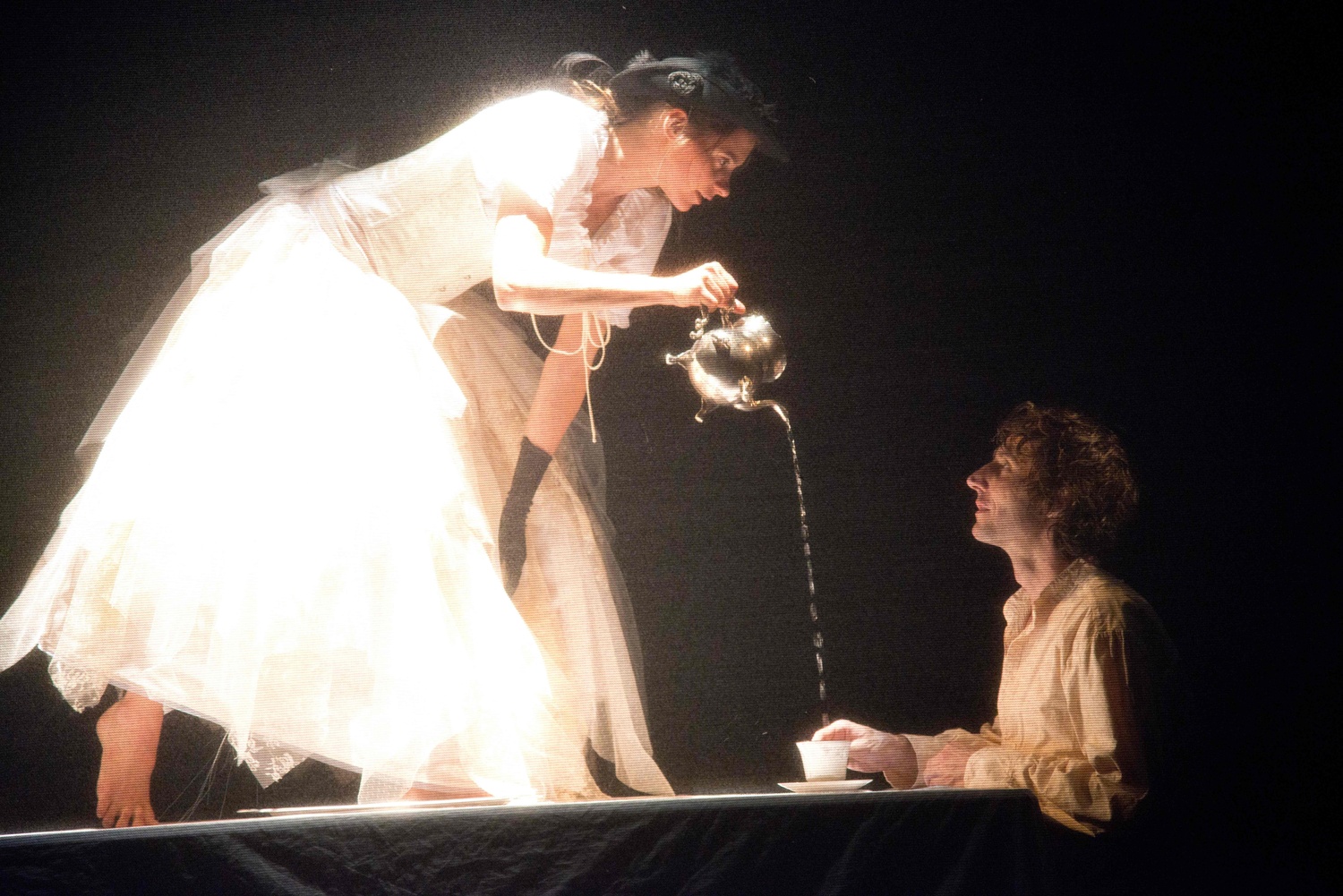
News
Summers Will Not Finish Semester of Teaching as Harvard Investigates Epstein Ties

News
Harvard College Students Report Favoring Divestment from Israel in HUA Survey

News
‘He Should Resign’: Harvard Undergrads Take Hard Line Against Summers Over Epstein Scandal

News
Harvard To Launch New Investigation Into Epstein’s Ties to Summers, Other University Affiliates

News
Harvard Students To Vote on Divestment From Israel in Inaugural HUA Election Survey
“Red-Eye to Havre de Grace” Brings Poe Back to Life


“Red-Eye to Havre de Grace,” playing Feb. 13 to 16 at the Emerson/Paramount Center Mainstage by theater collective Lucidity Suitcase Intercontinental, is a spellbinding, visually stunning depiction of the mysterious last days of Edgar Allan Poe. A tense exploration of grief, loneliness, and the pitfalls of genius, the musical quickly draws in the audience and doesn’t let go.
The production begins as Poe (Ean Sheehy) boards a train to Philadelphia in order to give a presentation to the Pennsylvania Literary Society. Although lonely, awkward, and depressed, he seems to be of sound mind, yet as the production continues, the audience sees the threads holding him together start to fray primarily due to the ghost of his long-dead wife, Virginia (Sophie Bortolussi).
Much of the musical’s magnetism is due to Sheehy’s excellent portrayal of Poe. Sheehy takes a man too often reduced to a caricature of the “tortured artist” and renders him as a three-dimensional, relatable character. Throughout the work, Poe composes intimate letters to his mother-in-law (who was also his aunt); Sheehy dictates the letters with intense, palpable emotion; he skilfully reaches past his character’s tendency to go off on philosophical and metaphysical tangents and brings to the forefront the anxieties and instabilities that led him to his strange and untimely death.
Despite the strength of Sheehy’s performance, Bortolussi (who also choreographed the whole musical) steals the show with her portrayal of Virginia. Her performance is mesmerizing, complex, and wonderfully expressive, all without saying a single word. She haunts Poe throughout the story, seeming alternately tender and cruel, loving and vengeful.
In one memorable scene, Bortolussi emerges like a corpse from the ground at Poe’s feet, seeking to draw him down with her into the earth; in another, she hovers above him as he enters a train compartment and then slips down to stay with him while he sleeps. The incredible physicality of Bortolussi’s performance – jumping, falling, climbing, and being thrown–heightens the emotional impact of the drama playing out on stage. She is impressively ominous at times, with halting, angular, almost zombie-like movements. As Poe becomes weaker, Virginia gains in strength. Her ghost becomes more audacious and real until Poe, and surely the audience, can think of nothing else.
Having one of the actors in a three-person musical be absolutely silent is only a part of the avant-garde unconventionality that characterizes the show. The set design, created by director Thaddeus Phillips, is decidedly minimalist; a single chair, two beat-up pianos, a patch of grass, and a few doors (variously used as desks, ceilings, trapdoors, and even a chicken coop) are the only props. Phillips’ creativity and ingenuity shine in his blocking of the actors and how they interact with the scenery. As the curtain rises, the scenery is arranged in order to give the perspective of someone looking down on Poe. His desk is flipped on its side, and Sheehy is draped over it so he appears to be below the audience: this creates the sensation of being a fly on the wall. This barrier between the actors and the audience is then slowly eroded throughout the production.
Jeremy Wilhelm plays Ranger Steve, the production’s only singing character, and he manages the score admirably with a clear, strong tenor. The writers used Poe’s work as much as possible, and many of the songs are simply Poe’s poetry set to music. In one of the show’s most striking scenes, Steve performs a Spanish translation of “El Dorado” to simple guitar accompaniment as Poe confronts Virginia’s ghost. They set off together on a passionate pas de deux, and Virginia’s presence grows until it dominates the stage (quite literally, as she wears two-foot stilts throughout the dance).
The passion and the wildness of the relationship between Poe and Virginia grow in tandem with Poe’s madness until he can bear it no more. In the climactic final scene, Virginia’s ghost keeps watch as a dying Poe recites these lines from his last work, “Eureka”: “I have spoken of memories that haunt us during our youth. They sometimes pursue us even in our manhood–assume gradually less and less indefinite shapes.” In this moment, the lines are given new significance. This is the great achievement of “Red Eye to Havre de Grace”: it is written about a poet, but in the end it reveals a man.
Want to keep up with breaking news? Subscribe to our email newsletter.
